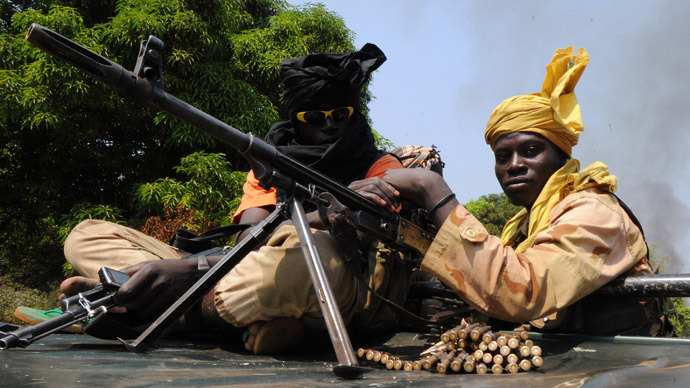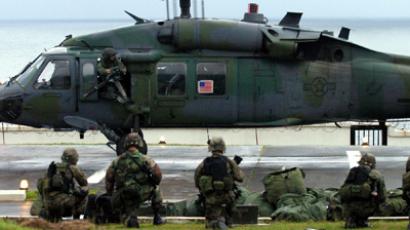Central African Rep. rebels seize capital, announce president deposed

Central African Republic rebels have reportedly deposed President François Bozize after seizing the capital Bangui and the presidential palace there. The whereabouts of Bozize remains unknown as he is thought to have fled the county prior to losing power.
Some speculation suggests he crossed into the Democratic
Republic of Congo early Sunday, Reuters reported citing an
anonymous source said to be a presidential advisor.
The rebels issued a statement that said French President
Francois Hollande "has taken note of the departure of President
Francois Bozize."
"Central African Republic has just opened a new page in its
history," AP cites a communique signed by Justin Kombo
Moustapha, secretary-general of the alliance of rebel groups
Seleka.
UN Secretary-General Ban Ki-moon has condemned what he called an “unconstitutional seizure of power” in the Central African Republic and called for the restoration of constitutional order on Sunday.
“The secretary-general is deeply concerned by reports of serious violations of human rights. He underscores that those who are responsible for committing such violations will be held accountable,” Reuters quoted UN press office as saying.“The Secretary-General appeals for calm and for the respect of the rule of law in the CAR”.
The Seleka rebel coalition, whose members have long opposed
Bozize, took the city late Saturday and fought their way to the
strategically important city center in Bangui.
The group that began its offensive in December, seizing about one-third of the country, accuse
the president of breaking a January peace agreement. Fighters
sought to send home South African forces that were helping to boost
the country's military and integrating 2,000 rebel fighters into
Central African Republic's armed forces.
Seleka, Central Africa's rebel coalition, numbers beween 1,000 and 3,000 fighters, many of whom are ex-mutineers and former militiamen from earlier rebel movements. The coalition wants to organize a transition towards democratic elections in CAR. Seleka is thought to have come into existence only last September, when three of the country’s rebel groups – The Patriots’ Convention for Justice and Peace (CPJP), the Union of Democratic Forces for Unity (UFDR), and the Democratic Front of Central African People (FDPC) – united in opposition to the Bozizé regime.
The conflict between the two sides deteriorated more than a week ago, with the rebels again taking control of two towns and threatening to advance on the capital.
On the eve of the invasion witnesses in the capital said people
tried to flee the city as the rebels were approaching. Schools and
banks closed early following reports of the advance.
As hundreds of armed rebels took Bangui, they cut power to much of
the city. Residents in one area of the capital where fighting
erupted Saturday said the rebels were dressed in civilian clothes,
according to Reuters.
In the northern suburbs, Seleka rebels managed to take control of
the neighborhood around Bozize's private residence. However, there
they were told Bozize was in the presidential palace in the town
center.
As rebel columns pushed towards the presidential palace, they
clashed with government forces deployed to repel the
insurgents.
"For us, there is no other solution than the departure of
François Bozize," AP quoted, Eric Massi, a rebel spokesman, who
spoke by phone from Paris on Saturday.
Government troops, however, retained control of the city center,
home to the presidential palace. France had bolstered its
250-strong troop contingent in the country by an extra 150
personnel, sending the added firepower to help defend the city’s
major airport. If forced to evacuate the 1,200 French civilians in
the country, the airport would likely prove an invaluable
lifeline.
Government spokesman Crepin Mboli-Goumba said the government was
still in control of the capital. "President Bozize is still in
power," Reuters reports, quoting the state representative. "Bangui
has still not fallen."
The recent violence is the latest in the series of rebels’ unrest
and coups since the Central African Republic, a nation of 4.5
million people, became independent from France in 1960.














